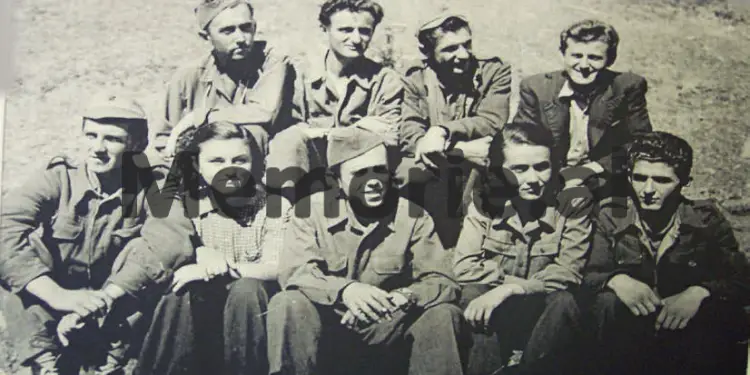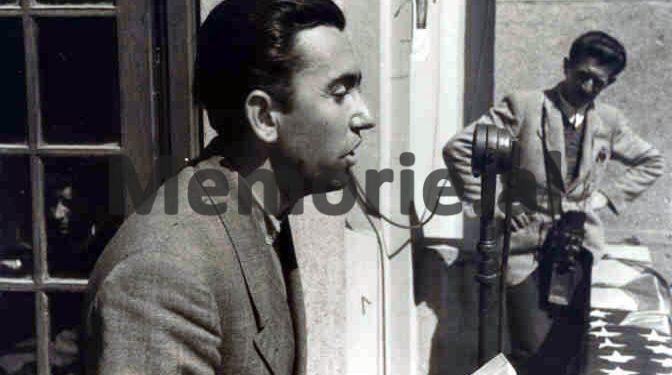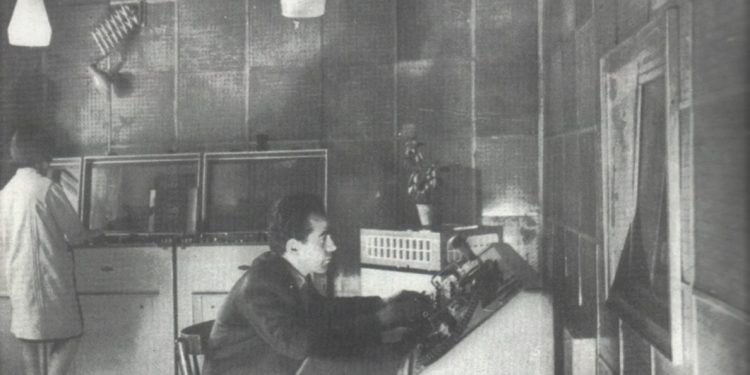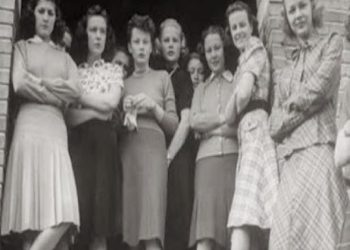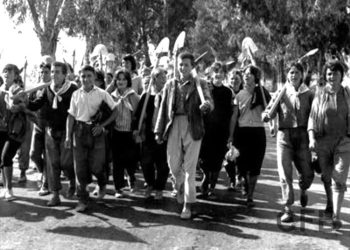Dashnor Kaloçi
The first part
Memorie.al publishes some archival documents issued by the Central State Archive in Tirana (fund of the former Central Committee of the ALP), which contain the minutes of two meetings of the Politburo held in 1965 – ’66 , where Enver Hoxha then communicated to Fadil Paçrami at the meeting of June 16, 1965, that the Politburo had decided to appoint him to the post of Minister of Culture and Arts, points out to him, telling him that he continued to deal with drama, leaving aside from the work and problems of the Party, so much so that when one of his plays was being played at the “Migjeni” theater, he got up and went to Shkodra for the whole night, where after seeing the drama, he had a meeting with the intellectuals of the city ?! The meeting of February 1966, where Enver Hoxha after communicating to three members of the Politburo, Manush Myftiu, Rita Markos and Gogo Nushi, their appointment as first secretaries of the Party Committees of the district of Tirana, Durres and Berat, being given the relevant tasks and orders for where they would go to work and wished them success in their new task, at the end of the meeting, asked Manush Mufti to pay attention to Fadil Paçrami, as he continued to deal with drama and yes came to the Opera and Ballet Theater, his drama, “House on the Boulevard”! Enver’s explosion at that meeting where he decided to dismiss Paçram from the post of Minister of Culture and Arts (where he had appointed him only a few months ago), considering his drama a real scandal and a dirty job, as According to him, there were no works about the teacher who opened 45 schools in Mirdita and killed him, about the heroes who fought in the war for the freedom of the homeland, about Skanderbeg, etc., but about his drama, about a girl who was pregnant. ?!
Discussion of Enver Hoxha at the meeting of the Political Bureau of the Central Committee of the ALP, on June 16, 1965
On this occasion that the Politburo is entrusting you with the task of Minister of Culture, I would like to make some remarks to you, Comrade Fadil (Paçrami), which will serve you for the progress of the work in this department. Other friends may also have remarks. First of all, I want to tell you that in the implementation of the Party line in you do not show that liveliness, that care and that perseverance that should exist in a cultured and old staff at work.
Throughout your activity in some cases a certain superficial attitude and sometimes underestimation of a persistent work and the experience of the base are also confirmed. During our cooperation with you, several times, we have found that you are quite subjectivist. This subjectivity has prevented you from looking at and appreciating the opinions of others.
Human thoughts must be related to our needs and situations. In this regard you have quite a few flaws. Not only should you not be subjective in your thoughts, but also better listen to the thoughts given by friends and co-workers and take them to the end. In addition, at work you have been hindered and hindered quite a bit by your inclination to write plays. We have pointed out this issue before.
You were involved in drama when you were the director of the Propaganda Directorate in the Central Committee, and this could not help but hinder you, a little more will hinder you in the position of minister. The dramas you make are either something that works quickly and can be of no value, or it takes a lot of effort and time.
If we take a good look at your plays, we would say that it would be more appropriate for our people to write a patriotic dramatic piece, which would lift the feelings of the people, than a dramatic piece with very elaborate issues that plunge the spectator into an inner war of feelings, as happens to yours.
I think that an artistic piece, well connected with the great current problems of the state and the Party, such as those of agriculture, would be more useful. Is there a war of feelings in the ranks of the cooperativists? Yes, this is true, I think that, through works of art, cooperatives and all our employees should, in the first place, be inspired by a love of work, to raise their conscience to produce as much as possible, etc., in order to get seriously into farming tasks wherever they work.
If we treat the issue in this way, I think that the “small feelings” will be overcome by the great feelings that will be treated and that constitute the true ideals of the Party and of the working people. Other aspects related to further strengthening of consciousness are complementary. Writing plays makes you dedicate a part of your work time to this activity.
You can tell us that what you write does not hinder you at work that you work for them at night. But, as my friends reported to me, you did not fall asleep when one of your plays was played in Shkodra, because you got up and went there at night and, after seeing the drama, the next day you had a meeting with the intellectuals of the city.
He took a completely opposite stance on the Party assets in Fier, from which he left saying: ‘I will come again’, instead of staying there until the end and listening to the discussions that took place about the work of the Party, and which for all of us matters firsthand.
My point is that in your person, on the one hand, there is a great preoccupation with writing plays, on the other hand, a lack of preoccupation with Party meetings, even these have been avoided. This is not good and shows unhealthy connections with work, with the performance of tasks on your part. Let us therefore point out these weaknesses in order to correct them, especially now that you are becoming a minister.
The work of the Minister of Culture is of great importance. That is why we separate Culture from the Education sector. In the Culture sector, you will have to deal with all kinds of people, tendencies and directions, with musicians and composers, with employees of theater, ballet and fine arts, with writers, etc., etc.
In all these areas the Party has a line, which must be defended and implemented to the end. You will defend the Party line, if in your work; you will not be guided by subjectivist tendencies. As Minister of Culture, in this important post given to you by the Party, you must be very careful not to overestimate the dramaturgy sector and neglect, say, ballet, painting, music, folklore, translating and publishing books, etc. ., or fall into subjectivism in relation to other authors who create and work in these fields.
As the main leader of the Ministry of Culture, in the right path of the party, you should try to harmonize everything, to insist strongly when necessary, to act according to the case and the problems that arise, in no way to start from the sentiments, but from the line, Party directives and norms.
Only the correct implementation of the Party line can ensure success in this important and extremely difficult sector. Therefore be very careful, first and foremost, in your relationships with people and their education. Beware of the tendencies, especially the tendencies of approaching some of the workers of art and culture and moving away from some others, that such a thing may happen to you, but always keep in mind the protection of the Party line.
The line is such that all sectors should be given the importance they deserve, so that the arts and culture workers see in you a minister who is equally interested and has a warm attitude with them and, within our material means, makes efforts to help everyone on the road and in the Party line at the same time.
Maintaining the closest possible contacts with the employees of this sector is of great importance. I think that not only you, but also the comrades who deal with the agitation and propaganda of the Party, with culture and education, should work even harder with the people of these sectors, with whom they are dealing, to go where they work and discuss where they gather or rest.
You can also help a lot in terms of preparing and giving directives, their implementation should be followed later in life. You’re going, for example, an hour to the club or where artists or writers gather, to the theater, etc., your social and warm attitude will bring people of art and culture closer to you and vice versa, will make them for every need, for every clarification, to come to meet you and socially tell you everything more easily than to turn to the Central Committee.
Meeting people is the only way to learn what is thought and discussed, what their demands and views are, and here it will look like the Party line is being implemented on the cultural front, which should be given importance great. Some of these I am telling you, I may have even seen superficially, so do not take them as something bad that has formed in my opinion of you.
Comrade Ramiz Alia told me that he also spoke to you about your shortcomings and you knew them. We have called the remarks we have made regarding these shortcomings sufficient. Comrade Rita Marko has also made some remarks to you. The remarks that we are making now, if we say them socially, as a member of the Central Committee and as a friend who has held responsible positions, and which we are now sending to another, even higher task.
We are convinced that you will reflect on these remarks and will work well in the Ministry of Culture. Your cooperation with all the comrades in the ministry, with those of the Presidency of the Government, with the comrades of Propaganda, Education and Culture in the Central Committee, as well as with all the rest of us, must be close and communist. Memorie.al
The next issue follows




